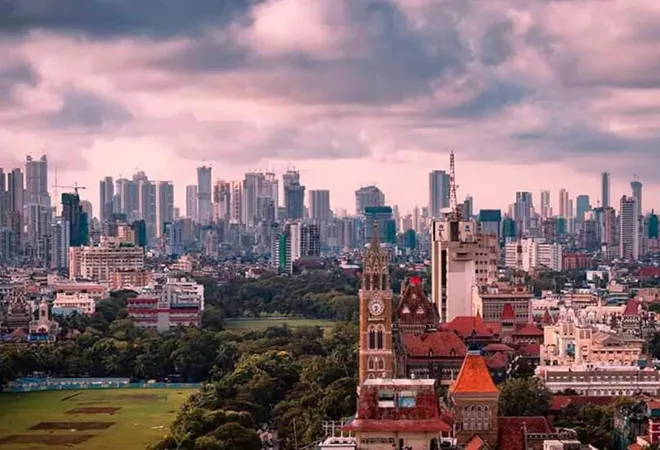
Amongst the standout challenges confronting Indian cities, climate change has become the most critical concern. Over time, climate change will have severe outcomes around the world. The worrying part for urban local bodies (ULBs) is that the consequences of climate change will manifest themselves heavily in cities. Already, Indian cities are witnessing urban floods, cyclones, harsh winters, and oppressive heat waves with increasing frequency and intensity. Apart from the loss of human lives and its impact on urban health, these events take a heavy toll on municipal infrastructure, livelihood, and the general economic well-being of municipalities. Since cities are now home to more than half of the global population and are destined to get demographically
even bigger, what happens in cities will largely determine the future of worldwide efforts at addressing challenges related to climate change.
Cities have an added responsibility since they consume three-fourths of energy and generate about
75 percent of the worldwide global CO
2 emissions. They have undoubtedly emerged as the key contributors to climate change. For cities to play a major role in the fight against climate change, ULBs must prioritise action on building resilience against climate change and consider it a key municipal responsibility. Unfortunately, the words mandating the ‘preparation and implementation of Climate Action Plan’ do not appear in most Indian municipal statute books. States would do well to include post-haste the preparation, implementation and monitoring of climate action plans as an obligatory municipal function.
Since cities are now home to more than half of the global population and are destined to get demographically even bigger, what happens in cities will largely determine the future of worldwide efforts at addressing challenges related to climate change.
Many countries have local climate plans (LCP) mandated by law. In
Europe, for instance, Denmark, France, Slovakia and the United Kingdom (UK) have made the adoption of LCPs compulsory. In the UK, LCPs have been in existence since 2008, where local planning authorities have a statutory responsibility to include in their
local planning documents “policies designed to secure that the development and use of land in the local planning authority's area contribute to the mitigation of, and adaptation to, climate change”. Advice in many countries is also forthcoming about how city governments can integrate climate change-related issues into other local policy processes. There is also evidence to suggest that the existence of
national regulation has a substantial impact on leading cities to the task of local climate planning.
As cities prepare to brace themselves for the consequences of climate change, they must do their homework thoroughly. They would be required to develop a comprehensive city action plan (CAP) for measuring, planning, and reducing greenhouse gas emissions. The cities would have to come up with a CAP for
mitigation as well as
adaptation. The former involves plans for reducing the flow of heat-trapping greenhouse gases into the atmosphere in a given time frame. Such reduction would be achieved by reducing the sources of these gases—burning fossil fuels for electricity or transport, and conducting economic activities in a sustainable manner. The latter involves adjusting to actual or expected future climate and requiresrequires reducing the risk of the harmful effects of climate change that comprise extreme weather events. The mitigation and adaptation strategies must be broken down into specific implementation projects backed by financial resources. In Maharashtra, cities are already mandated to prepare an annual Environmental Status Report (ESR) that updates data on transport, air pollution, noise pollution, solid waste, open spaces, water, sewerage, etc. The ESR could as well be expanded to include data that would allow informed decisions on climate change.
The mitigation and adaptation strategies must be broken down into specific implementation projects backed by financial resources.
The Brihanmumbai Municipal Corporation (BMC) is the first Indian city to prepare a climate action Plan. The
MCAP (Mumbai Climate Action Plan) 2022 aims at intensifying BMC’s focus on tackling climate change and increasing Mumbai’s climate resilience. MCAP is framed as a policy document, leveraging scientific knowledge backed by data and an evidence-based planning approach. It identifies urban flooding, coastal risks, urban heat, landslides, and air pollution as the major vulnerability areas of the city and outlines ways of mobilising resources to move from action planning to strategic projects. The MCAP also spells out an institutional mechanism in the form of a ‘Climate Cell’ to coordinate the implementation and monitoring of all activities related to climate change.
The MCAP highlights that while the BMC would be at the forefront of the mitigation efforts and attempts towards building city resilience, the state, all city institutions and all citizens are vital stakeholders and each has significant roles to play. Apart from the BMC, the industry, academia, non-government organisations, community-based organisations, residential societies, and individual citizens would have to join the monumental task of mitigation and adaptation. The Government of India and state governments are expected to give clear policy directions and financially support the local governments. Additionally, they have to demonstrate their serious intent by doing all that is necessary for subjects and areas that fall within their domain.
Since climate change will impact cities worldwide, though, with varying intensity in different areas, cities need not work in silos but share their experiences and learn from the experiences of others. Such sharing of best practices is already happening. For instance, C40 Cities Climate Leadership Group
(C40) links about a hundred big cities and brings them on a single platform to address climate change and share urban initiatives to reduce GHG emissions. Similarly, the Local Governments for Sustainability
(ICLEI) has launched a global network of more than 1,500 cities in 86 countries committed to building a sustainable and low-carbon future. Within the country, the National Institute of Urban Affairs (
NIUA) and the World Resources Institute (WRI) have crafted India’s first national coalition platform to mainstream eco-based services and nature-based solutions to build urban climate resilience. At the state level, cities could have a common platform of chief executives sharing best practices and inputs regarding climate change planning-related knowledge.
The Government of India and state governments are expected to give clear policy directions and financially support the local governments.
Updating, sharing, and disseminating climate-related experiences would require institutional support for the capacity-building of all stakeholders. This will have to be an ongoing effort, as the impacts of climate change would be dynamic, requiring periodic revisions in the targeted action and corresponding capacities. Since all city stakeholders need to get involved in the effort, and since many aspects of current urban living run contrary to the requirements of sustainability, lifestyles would need to be modified or eschewed to bring living in line with the protection and conservation of the environment and environmentally responsible behaviour (ERB). Conscious efforts towards conserving water, generating less waste, greater use of public transport, increased use of green energy and promoting greenery and urban agriculture in homes are some of the climate-friendly practices that individual citizens would have to be encouraged to adopt. Climate action plans will have greater applicability if they comprise annual emission reduction targets and establish a multistakeholder action plan regarding strategies for heat, cyclones, and landslides. Indeed, the colossal task facing humanity would not brook absentees.
Ramanath Jha is a Distinguished Fellow at the Observer Research Foundation
The views expressed above belong to the author(s). ORF research and analyses now available on Telegram! Click here to access our curated content — blogs, longforms and interviews.



 Amongst the standout challenges confronting Indian cities, climate change has become the most critical concern. Over time, climate change will have severe outcomes around the world. The worrying part for urban local bodies (ULBs) is that the consequences of climate change will manifest themselves heavily in cities. Already, Indian cities are witnessing urban floods, cyclones, harsh winters, and oppressive heat waves with increasing frequency and intensity. Apart from the loss of human lives and its impact on urban health, these events take a heavy toll on municipal infrastructure, livelihood, and the general economic well-being of municipalities. Since cities are now home to more than half of the global population and are destined to get demographically
Amongst the standout challenges confronting Indian cities, climate change has become the most critical concern. Over time, climate change will have severe outcomes around the world. The worrying part for urban local bodies (ULBs) is that the consequences of climate change will manifest themselves heavily in cities. Already, Indian cities are witnessing urban floods, cyclones, harsh winters, and oppressive heat waves with increasing frequency and intensity. Apart from the loss of human lives and its impact on urban health, these events take a heavy toll on municipal infrastructure, livelihood, and the general economic well-being of municipalities. Since cities are now home to more than half of the global population and are destined to get demographically  PREV
PREV


